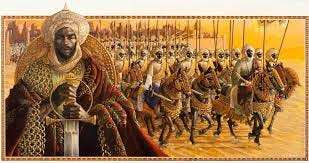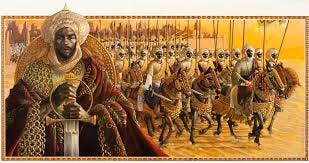Today In Black History: Mansa Musa
Emperor of the Mali Empire is the richest man in recorded history
Issue #848 Today In Black History, Monday, April 28, 2025
If you like us, REALLY like us, please click the little heart “Like” button at the top of this post!
Buttons:
Heart: Like Bubble: Comment Arrow Up: Share Arrows Circle: Restack
If you like us, REALLY like us, please click the “Like” button at the top of this post!
Your “Likes” mean a LOT to us! We appreciate your support!
Engage with us and our posts in Substack Notes, where we post almost daily.
Our April 2025 subscriber goals are 200 new free subscribers and 100 new paid subscribers! You can help us reach our goal!
Follow Pam on Bluesky, the best “X” alternative.
Follow Keith on Bluesky, the best “X alternative.
Independent Authors and Creative Professionals: books and courses on Branding and Marketing just for you via Pam Speaks 2 You.
We appreciate your support!
Hey Elon! You think YOU’RE the wealthiest man in the world? Well, maybe today, but nowhere near in recorded history! Let me introduce you to the RICHEST MAN IN HISTORY, Mansa Musa!
Mansa Musa, also known as Musa I of Mali, was the ninth emperor of the Mali Empire, one of the prosperous and powerful West African states during the 14th century. His reign, which lasted from 1312 to 1337, is often regarded as a golden age for the Mali Empire, characterized by wealth, cultural flourishing, and territorial expansion.
The Mali Empire was founded earlier in the 13th century by Sundiata Keita and quickly rose to prominence in West Africa. At its height under Mansa Musa, the empire included present-day Mali, Senegal, Gambia, Guinea, Niger, Nigeria, Chad, and Mauritania. This vast region was rich in natural resources, particularly gold and salt, which were critical commodities in trans-Saharan trade.
Mansa Musa's legendary wealth primarily stemmed from the vast gold reserves in his empire. Gold was highly sought after in both the Islamic world and medieval Europe, making Mansa Musa's holdings incredibly valuable. His fortune was so immense that modern economists and historians often struggle to quantify it accurately, but it is estimated to be equivalent to hundreds of billions of dollars in today's terms, far surpassing contemporary figures like Elon Musk or Jeff Bezos.
One of the most famous accounts of Mansa Musa's wealth and generosity comes from his pilgrimage to Mecca in 1324. Musa's entourage reportedly included thousands of soldiers, attendants, and slaves, along with 100 camels, each carrying hundreds of pounds of gold. His pilgrimage was so lavish that when Musa passed through Cairo, his spending and the gold he distributed caused a significant devaluation of gold in Egypt's economy, leading to inflation that reportedly lasted over a decade.
Mansa Musa also participated in the Transatlantic slave trade, as did many Arab and Sub-Saharan tribal and area leaders. Mansa Musa’s wealth included payment for those enslaved Africans.
After his life-changing trip to Mecca to complete the Hajj, Mansa Musa ended his trading in human beings.
Beyond his wealth, Mansa Musa significantly impacted the cultural landscape of West Africa. He was a devout Muslim and used his resources to promote Islam throughout his empire, building numerous mosques and learning centers. One of the most notable constructions from his reign is the Djinguereber Mosque in Timbuktu, which remains a UNESCO World Heritage site. Timbuktu itself became a hub of education, attracting scholars, poets, and artists from various regions, leading to an intellectual and cultural boom that influenced the Islamic world and beyond for centuries.
Mansa Musa's reign is often seen as the epitome of the Mali Empire's power and prestige. His incredible wealth, strategic governance, and patronage of culture left a lasting imprint on the history of Africa and the world. Today, he is celebrated not only as the wealthiest individual in recorded history but also as a ruler who leveraged his fortune for the advancement of his people and culture.
The 20-minute video below gives excellent details and opinions about the rise and fall of Mansa Musa and the Mali empire, both of which are still considered the wealthiest in history.
Today In Black History
In 1847, George B. Vashon became the first African American to pass the New York State Bar.
In 1848, slavery was abolished in the French colonies.
In 1891, Black inventor George Tolliver was awarded a patent for a ship’s propeller.
In 1941, the U.S. Supreme Court ruled that separate railroad facilities must be substantially equal.
In 1957, W. Robert Ming, the first Black person to chair a major national veterans organization, was elected Chairman of the American Veterans Committee.
In 1967, Muhammad Ali lost recognition of his heavyweight boxing championship by the World Boxing Association and the New York State Athletic Commission because of his refusal to serve in the U.S. Armed Services during the Vietnam War.
In 1971, Samuel Lee Gravely became the first Black admiral of the United States Navy.
In 1983, Black writers Alice Walker and Gloria Naylor won American Book Awards for Fiction.
All “We Are Speaking” posts are now free for everyone to read, and commenting on our posts is now open to everyone!
Share this post:
Share this publication:
Our subscriber goals for April 2025 include 200 new free subscribers and 100 new paid subscribers. Click the link to help us reach our goals!
Our paid subscribers are encouraged to discuss this post in our W.A.S. Chat Community.
Join Pamela Hilliard Owens’s subscriber chat
Available in the Substack app and on the web
You are also welcome to view “We Are Speaking” in Substack Notes. You can also read other Substack publications without subscribing to them when you join Notes.
Did you know that you can listen to each “We Are Speaking” post and engage directly with us on the Substack App? Download the app!
Please check out Keith’s AfroFantasy Detroit Substack for posts about fantasy, sci-fi, and Afrofuturism!









Good post. Odd that I never heard about this guy, or the empire of Mali, when I was in high school.
My favorite show-boating African. When I taught college World History, I used a textbook that had an image of him on the cover. There was one unintentional negative of Mansa Musa’s amazing hajj to Mecca: Word about it spread and Europe became increasingly interested in exploring the African continent in search of gold.